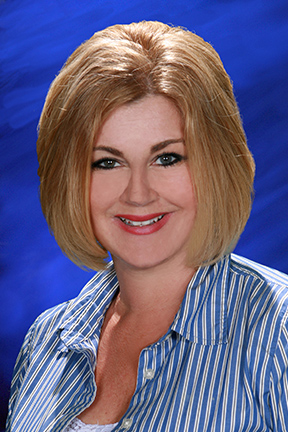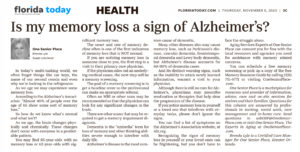
 Brenda Lyle – Special to FLORIDA TODAY
Brenda Lyle – Special to FLORIDA TODAY
Reader question: Is my memory loss a sign of Alzheimer’s?
Answer: In today’s multi-tasking world, we often forget things like car keys, the name of our second cousin and even why we’re looking in the refrigerator.
As we age we may experience some memory loss.
 According to the Alzheimer’s Association: “Almost 40% of people over the age of 65 show some sort of memory loss.”
According to the Alzheimer’s Association: “Almost 40% of people over the age of 65 show some sort of memory loss.”
So how do we know what’s normal and what isn’t?
As we age, the brain changes physically and chemically. These changes don’t occur with everyone in a predictable pattern.
You may find 85-year-olds with no memory loss or 62-year-olds with significant memory loss.
The onset and rate of memory decline often is one of the first indicators of memory loss that is NOT normal.
If you are noticing memory loss in someone close to you, the first step is a visit to their primary care physician.
If the physician rules out an underlying medical cause, the next step will be a memory screening.
The goal of a memory screening is to get a baseline score so the professional can make an appropriate referral.
Often an MRI or other scan may be recommended so that the physician can look for any significant changes in the brain.
There are other scans that may be required to get a memory impairment diagnosis.
Dementia is the “umbrella” term for loss of memory and other thinking abilities severe enough to interfere with daily life.
Alzheimer’s disease is the most common cause of dementia.
Many other diseases also may cause memory loss, such as Parkinson’s disease, vascular dementia, frontotemporal dementia and Lewy body dementia, but Alzheimer’s disease accounts for 60-80% of dementia cases.
And its distinct warning signs, such as the inability to retain newly learned information, warrant a visit to your physician.
Although there is still no cure for Alzheimer’s, physicians may prescribe medication or therapies that help slow the progression of the disease.
If you notice memory loss in yourself or a loved one that interferes with everyday tasks, please don’t ignore the signs.
You can find a list of symptoms on the Alzheimer’s Association website, at Alz.org.
Recognizing the signs of memory loss in yourself or your loved ones can be frightening, but you don’t have to face the struggle alone.
Many programs and resources for those caring for someone with dementia are offered by ADRC. More information is available at ADRCcares.org.
Aging Services Experts at One Senior Place can connect you for free with the local resources and agencies you need for assistance with memory related concerns.
You can schedule a free memory screening or pick up a copy of the free Memory Resource Guide by calling (321) 751-6771 or visiting OneSeniorPlace.com.
One Senior Place is a marketplace for resources and provider of information, advice, care and on-site services for seniors and their families. Questions for this column are answered by professionals in nursing, social work, care management and in-home care. To submit a question, send an email to askOSP@OneSeniorPlace.com or visit One Senior Place, The Experts in Aging at OneSeniorPlace.com.
Brenda Lyle is a Certified Care Manager for One Senior Place, Greater Orlando


